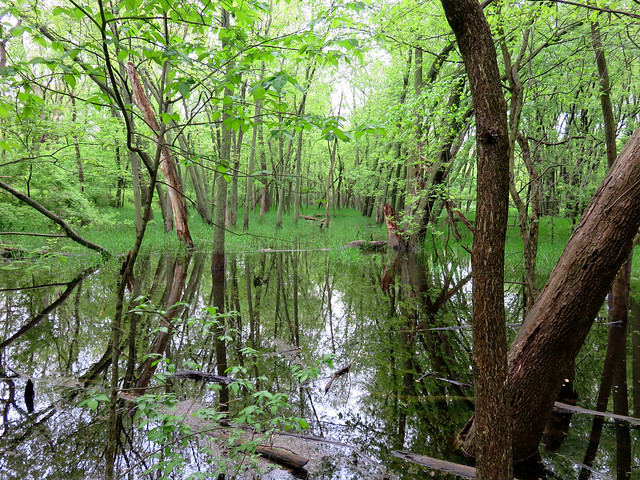
The skies were either cloud-bound or spotlessly blue. Here is the entrance to nearby Nelson Lake preserve in Batavia, on a beautiful morning in early May:
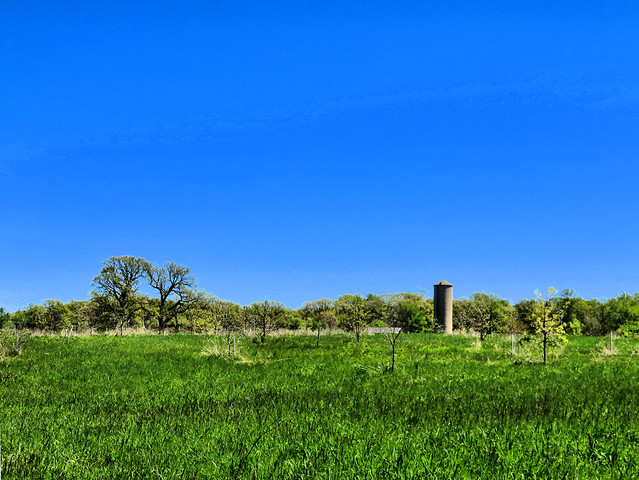
The Orchard Oriole is one bird which I have had trouble locating and photographing. It often mixes in with the much more colorful Baltimore Orioles, and seems to prefer to hide amid the leaves in the treetops. Its song is fairly distinctive, and I have heard it much more often than I have seen the originator.
A bit drab, the male can appear to be all black in poor light. Indeed, orioles are members of the blackbird family, but the Orchard Oriole is smaller than any of our other native blackbirds. It breeds over the eastern half of the US into central Mexico but its range generally stops short of Canada and does not include the Florida peninsula. It winters in Central America. It spends relatively little time on its breeding grounds, arriving in May, raises only one brood, and usually departs south in July.
By way of comparison, here is the more conspicuous Baltimore Oriole, which is bright orange rather than chestnut brown:
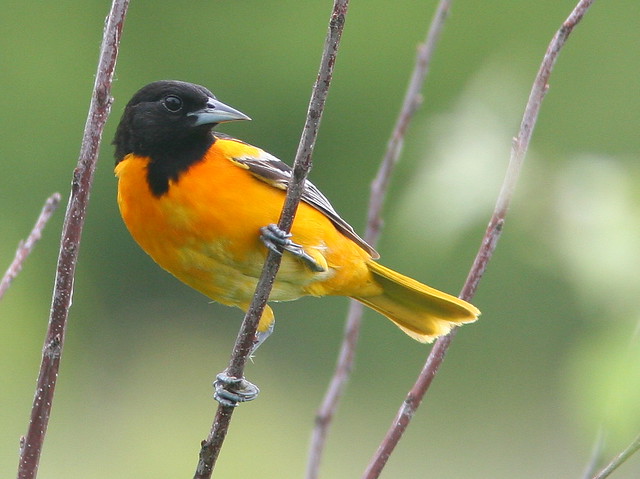
This was my first decent image of an adult male Orchard Oriole, obtained back in May, 2013:
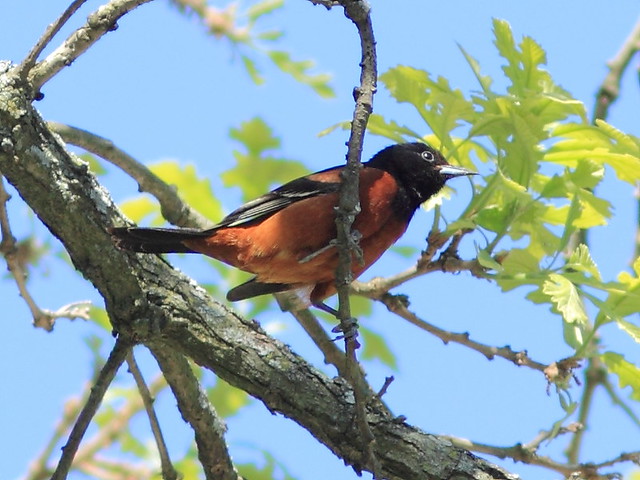
Last year, also in early May, another male cooperated with me:
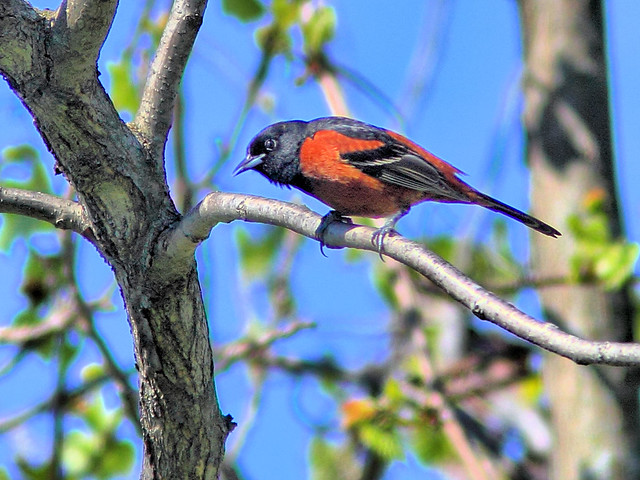
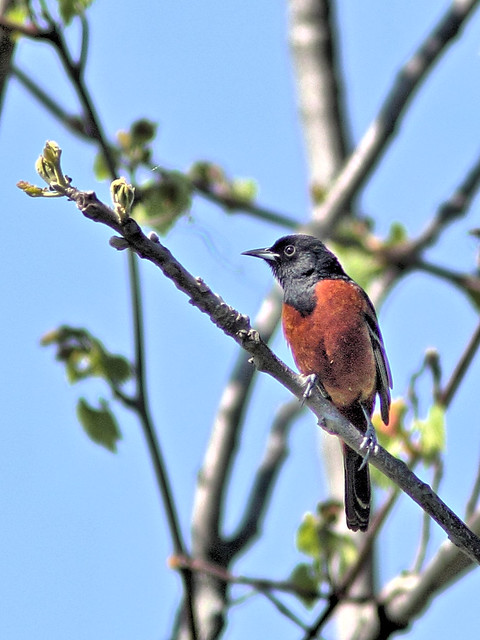
Immature males and females have yellow plumage rather than red. Younger males, up into their second year, have varying amounts of black on their face, head and upper breast. I first thought this one to be a female, but the heavy shadows on its chin and chest obscure the markings of a young male (May, 2015):
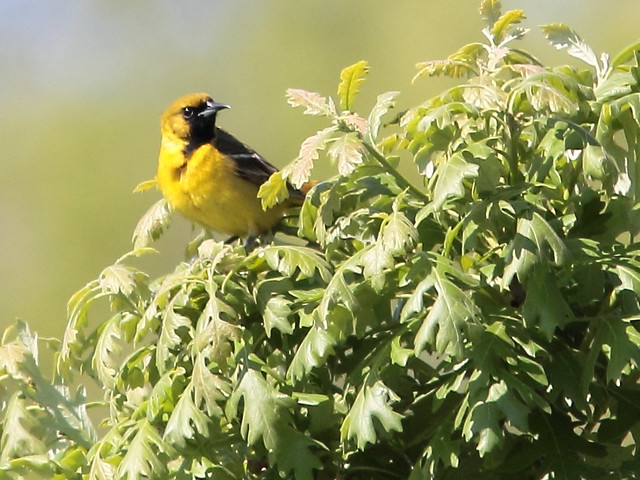
This spring, on May 12, at the Japanese Garden in Fabyan Forest Preserve in Geneva, I documented an adult male in a horrible photo:
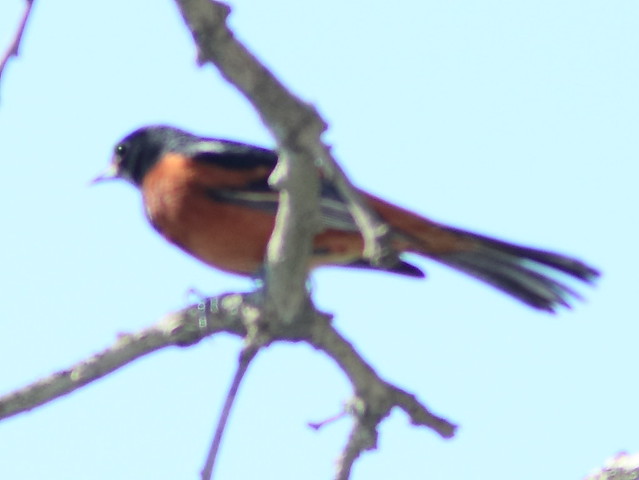
To compensate for such a poor showing, here is the fenced gateway to the Japanese Garden:
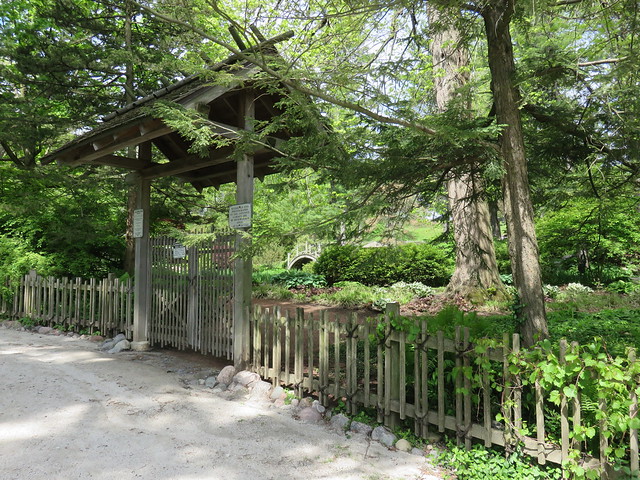
In late may, before returning to Florida, I heard the distinctive song of a sub-adult male Orchard Oriole coming from high in a tree along the trail in Lippold Park. It kept moving from one tree to another, usually flying away just as I brought it into focus. Mary Lou helped me track its meanderings, but continuing my run of bad luck despite my best efforts, I wasted many migapixels on blurry underbelly images and sky shots.
Here is a typical shot, heavily cropped...
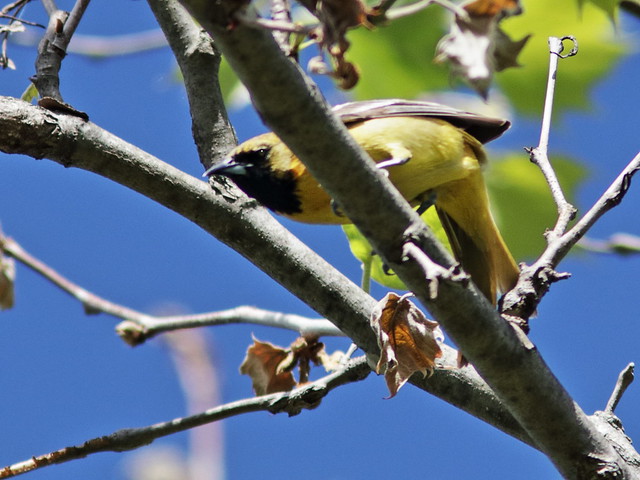
...and a few more:
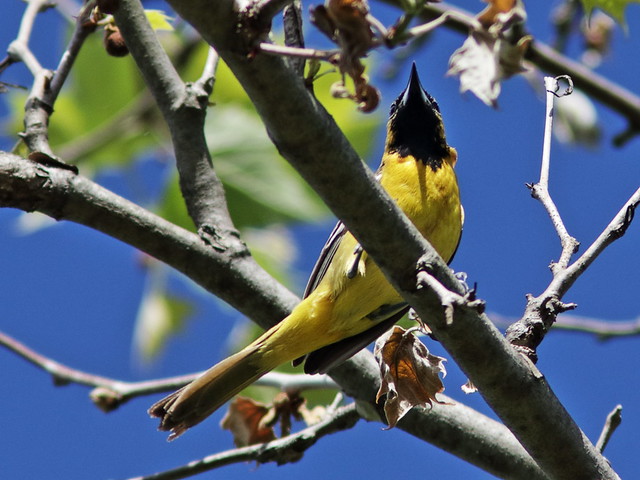
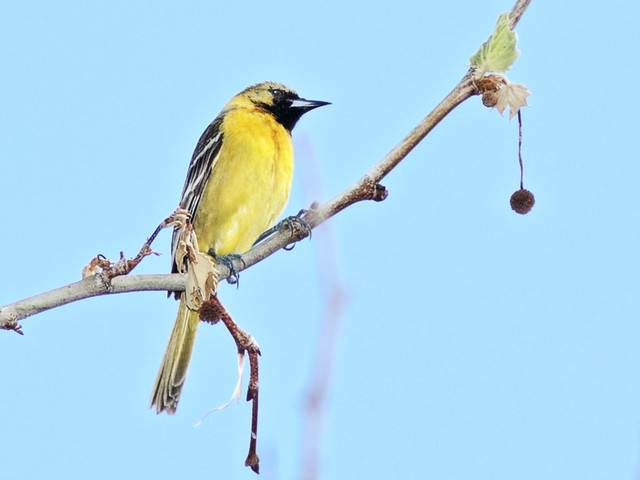
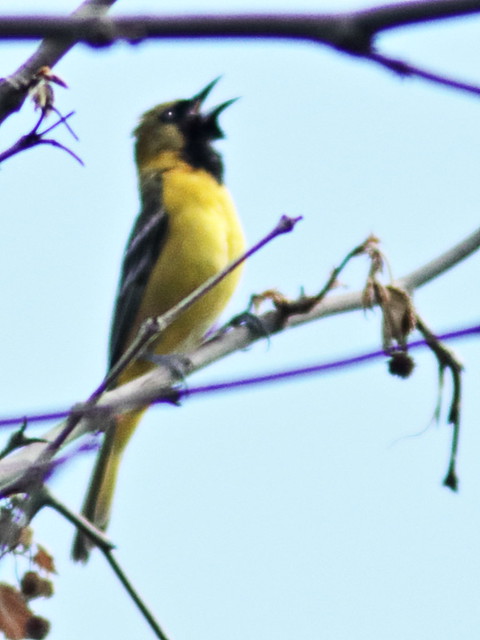
= = = = = = = = = = = = = = =
Linking to Misty's CAMERA CRITTERS,
Linking to Eileen's SATURDAY'S CRITTERS,
Linking to FENCES AROUND THE WORLD by Gosia
Linking to WEEKEND REFLECTIONS by James
Linking to BirdD'Pot by Anni
Linking to Wild Bird Wednesday by Stewart
Linking to Wordless Wednesday (on Tuesday) by NC Sue
Linking to ALL SEASONS by Jesh
________________________________________________
Please visit the links to all these memes to see some excellent photos on display
________________________________________________
Gorgeous birds! You have much more colourful ones than us over here in the UK. We have a few colourful ones, but most are pretty neutral tones.
ReplyDeletethe variety in the avian world is amazing :)
ReplyDeleteAn absolutely gorgeous and serene series, Kenneth! Thank you so much for sharing. I admire and appreciate your talent in photography.
ReplyDeletelovely fence and nature
ReplyDeleteExcelent photos Kenneth well executed, here in the UK we have the Golden Oriole (oriolus oriolus)just a few pairs breed in SE England and are difficult to find.
ReplyDeleteAll the best, Gordon.
Beautiful opening oriole shots... well captured!! The Japanese Garden gateway is stunning!
ReplyDeleteIncredible photos. You are talented.
ReplyDeleteWorth a Thousand Words
Lovely photography of beautiful birds and that blue, blue sky is great ~ ^_^
ReplyDeleteTerrific shots
ReplyDeleteYour orioles are wonderful!
ReplyDeleteGreat pictures, and great new picture for your header too!
ReplyDeleteI enjoyed seeing the birds, but the photo I like the most is the garden entrance
ReplyDeleteHave a great week-end!
Fine photography! Great reflection!
ReplyDeleteHello, ken! Awesome collection of Oriole photos. Great post. Thanks so much for linking up and sharing your post. Have a happy day and weekend!
ReplyDeleteGreat shots of oriole. Very beautiful bird.
ReplyDeleteLoved learning about and seeing these photos of the Orchard Oriole...I had never heard of it before. Particularly love the yellow ones (female and young)...all your photos are just gorgeous! Have a wonderful week.
ReplyDeletePretty images!!! Of all the orioles in my area, I am positive that the Orchard Oriole is my favorite. They gorgeous, aren't they? I can hear them singing in my mind as I view your photos Ken.
ReplyDeleteThanks so much for sharing this with us birders this weekend, at I'd Rather B Birdin'!!
I think your shots are fantastic. Birds do not stay still long enough for me to get a good shot.
ReplyDeleteI knew someone from Batavia. I'm not sure which sky I'd take given the oppressive heat of the last week. We got a break today so I'd go with the lovely blue sky. How interesting about the yellow color on the Orchard Oriole. You're too hard on yourself, I think your photos are very good
ReplyDeleteVery nice range of birds - I suppose the floods were good for wildlife and bad for people!
ReplyDeleteCheers - Stewart M - Melbourne
What a beautiful bird this is - worth all the trouble you went through! Your post reveals the frustrations of a bird watcher in trying to get the best shot:) Now, that would be a new thing for me, to be under a flood watch! I California it is always an earthquake watch, lol! Thank you for an honest recount of the experience of a bird watcher with All Seasons:) Have a great birding week!
ReplyDeleteLovely images!
ReplyDeleteThanks so much for sharing at http://image-in-ing.blogspot.com/2017/06/tidying-up-nest.html.
The orioles, both kinds and all ages, are beautiful. I don't think the Orchard needs to take a back seat to its cousin ... beautiful in a different way. Would love to see either... and you know I'd be happy with any of your reject pictures
ReplyDeleteWhat beautiful images! The birds are fantastic to see and the reflections are a tiny bright spot in the high waters. What bright colors and great scenery!
ReplyDeleteSo good to learn about these birds. I would have thought they were different species. No doubt the natural worlds is full of lovely creatures.
ReplyDeleteA beautiful bird in all its different plumage! How interesting that the female and young are yellow. Lovely water reflections and blue, blue skies.
ReplyDeleteGreat photos.
ReplyDelete